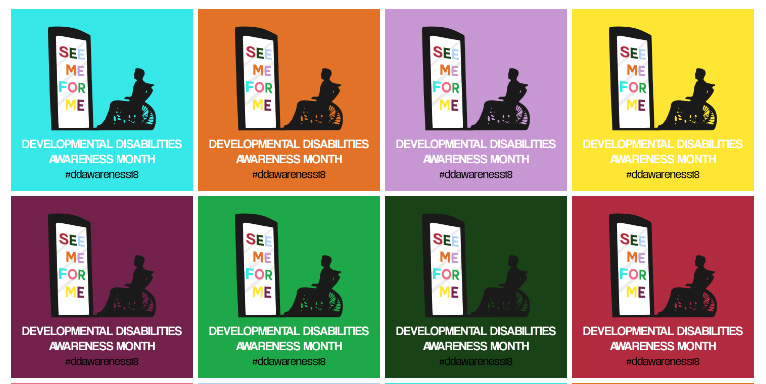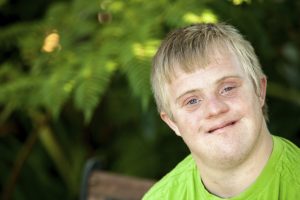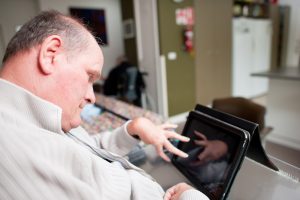
The theme for Developmental Disabilities Month 2018 is one of inclusion: “See Me for Me.”
In the bad old days, many institutions for people with developmental disabilities had a shocking reputation. One just needs to read the novels of Charles Dickens or watch television news exposés. By the 1970s and 1980s (long after the famous investigative piece by Nelly Bly in her searing report, Ten Days in a Madhouse, the movement to replace institutions with community-based settings was under way. This allowed for people developmental disabilities to live with a much higher degree of independence and dignity, not mention inclusion in the community.
A Call for Inclusion

Down syndrome is a physical, as well as an intellectual disability. Many people with the condition are known for their general happy disposition.
To raise awareness, President Ronald Reagan in 1987 proclaimed March “National Developmental Disabilities Awareness Month.” For 2018, the theme is “See Me for Me!” The central message is one of inclusion. In this effort, the National Association of Councils on Developmental Disabilities (NACDD), along with the Association of University Centers on Disability (AUCD) and National Disability Rights Network (NDRN), have created a resource guide focusing on each of four areas:
- “See me as your classmate”—Education
- “See me as your co-worker”—Employment
- “See me as your neighbor”—Community
- “See me as your friend”—Miscellaneous.
In other words, the focus is on inclusion, the full societal participation of people with disabilities. Emphasis is on the greatest degree of independence in the community possible. Of critical importance in the inclusion movement was the passage of the Americans with Disabilities Act (ADA), which President George H.W. Bush signed into law on July 26, 1990.
What Developmental Disabilities Are

Cerebral palsy includes a variety of physical disabilities, including impaired speech. However, many of these individuals have high intelligence.
The U.S. Centers for Disease Control (CDC) defines developmental disabilities as “a group of conditions due to an impairment in physical, learning, language, or behavior areas.” Furthermore, according to the CDC, about 4.6 million Americans, one in six children, have one or more developmental disabilities or other developmental delays. Sometimes, “developmental disability” is grouped with “intellectual disability,” as in “intellectual and developmental disabilities (IDD). An intellectual disability developmental disabilities include ADHD, the autism spectrum, cerebral palsy, fetal alcohol syndrome, fragile X syndrome, Down syndrome, Tourette syndrome, and vision and hearing impairments. The official Federal definition of any disability is a physical or mental impairment that substantially limits one or more life activities.

Often, people with autism are ideally suited for detail-oriented work.
The American Association on Intellectual and Developmental Disabilities (AAIDD) identifies factors of intelligence and adaptive behavior. Intelligence “involves the ability to reason, plan, solve problems, think abstractly, comprehend complex ideas, learn quickly, and learn from experience.” Although the IQ test is a commonly used assessment tool, it should never be the sole metric. (In fact that is often discriminatory and illegal.) Intelligence can manifest itself in many ways (e.g., memory, musical or artistic ability). Intelligence can manifest itself in many ways (e.g., memory, musical or artistic ability). Again, adaptive behavior comprises those practical and social skills of everyday living:
- Conceptual skills include receptive and expressive language, literacy, handling money, and independent self-direction.
- Social skills include getting along with others, taking responsibility, and having empathy. In addition, self-esteem is an important component, especially self-advocacy.
- Practical skills involve activities of daily living such as eating, dressing, mobility and toileting, and performing basic housekeeping and personal care.
Moreover, these limitations often coexist with personal strengths, which vary from individual to individual. In other words, people with disabilities have a very important message: “See me for me!”
Further Information
Both the CDC and the National Institute of Mental Health (NIMH) have research-based information on developmental disabilities.


